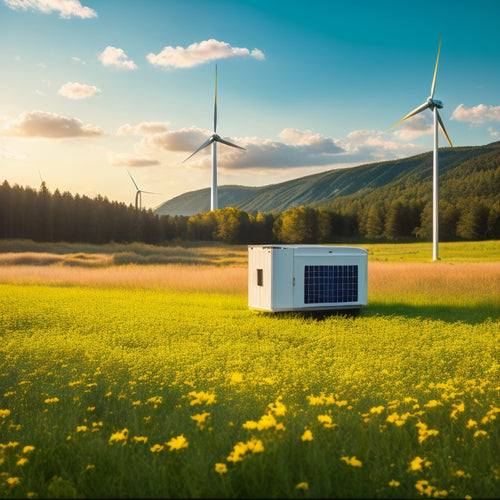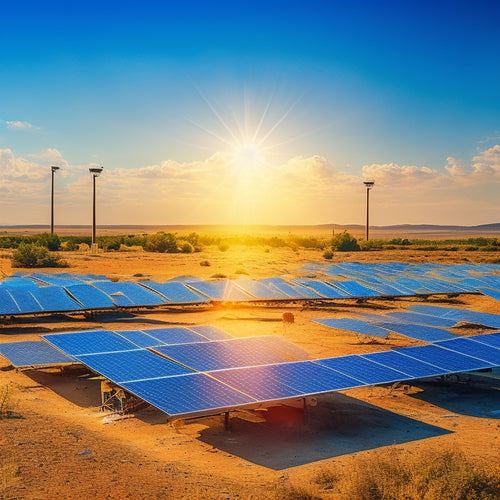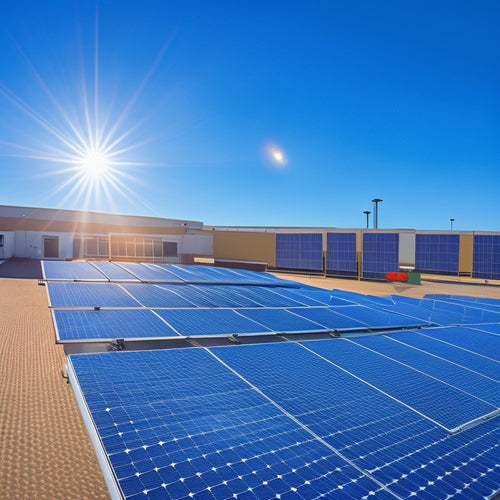
Power Backup System for Home
Share
You need a power backup system for your home to safeguard against power surges and outages, guaranteeing your devices and appliances are protected. A reliable system maintains consistent refrigerator temperatures, preventing food spoilage and financial loss. It's vital to choose a system that's compatible with your devices and has certifications like UL or ETL. You'll also want to take into account surge protection methods, voltage regulation, and calculating your power needs to confirm the system can handle your essential appliances. By understanding these key factors, you'll be well on your way to selecting a power backup system that meets your unique needs and keeps your home running smoothly when the grid fails.
The Essentials
- A reliable power backup system safeguards your home devices from power surges and outages, ensuring consistent refrigerator temperatures and preventing food spoilage.
- Identify critical appliances like refrigerators, medical equipment, and communication devices, and prioritize them based on importance and energy efficiency.
- Calculate the total wattage of essential appliances, including startup wattage, to determine the minimum power backup capacity required for your home.
- Advanced battery protection technology is crucial for prolonging battery lifespan and ensuring reliable performance during extended outages.
- Installing surge protection devices at the main electrical panel can prevent damage to circuits and devices, providing comprehensive protection for your home.
Protect Devices From Surge
When you invest in a power backup system for your home, you're not just protecting against outages - you're also safeguarding your devices from power surges that can damage or destroy them.
In fact, a reliable battery backup for home can prevent food spoilage and maintain safety by keeping critical home systems, such as refrigeration and lighting, functional during outages Home Energy Storage.
To guarantee device safety, you'll want to investigate surge protection methods that can absorb or divert electrical spikes, such as surge protectors, voltage regulators, and uninterruptible power supplies.
Surge Protection Methods
Your home's devices are constantly at risk of surge damage, which can occur when a significant increase in voltage flows through the power lines. This can happen when there's a lightning strike, utility grid issue, or even a faulty electrical circuit in your home.
To protect your devices, you need effective surge protection methods. In addition, investing in a battery storage system for your solar setup can provide an additional layer of protection against power grid fluctuations Energy Storage Solutions. This can guarantee that your devices remain safe and functional even during power outages.
Surge suppressors are a popular solution, offering a barrier between your devices and the power grid. Look for surge suppressors with high surge ratings to ascertain they can handle powerful voltage spikes. When choosing a surge suppressor, consider the surge capacity and the type of devices you need to protect.
For thorough home protection, consider installing surge protection devices at the main electrical panel. These devices can detect transient voltage spikes and divert them to the ground, preventing damage to your electrical circuits.
Device Safety Features
Vulnerability lurks in every device, waiting to be exploited by a power surge. That's why it's vital to prioritize device safety features when setting up your power backup system. You need to verify that your devices are compatible with the backup system to prevent damage or data loss. Look for device compatibility certifications, such as UL or ETL, to assure that your devices can withstand power surges.
Furthermore, when considering a power backup system, it's important to think about Renewable Energy Systems and how they can provide a reliable source of power during outages. By investing in a power backup system that integrates with renewable energy sources, you can reduce your reliance on the grid and guarantee a steady supply of power.
When installing your power backup system, follow the installation guidelines carefully to prevent any potential risks. Make sure to connect your devices to the backup system according to the manufacturer's instructions. This will assure that your devices receive the necessary protection from power surges.
Additionally, consider investing in a backup system with automatic shutdown features, which can detect and respond to power surges in real-time. By prioritizing device safety features, you can enjoy peace of mind knowing that your devices are protected from the unpredictability of power surges.
Saves Food From Spoilage
You know that the worst part of a power outage is often the spoiled food in your fridge and freezer.
With a home energy storage system, you can have peace of mind knowing that your food will stay fresh even during extended outages.
A power backup system for your home guarantees fresh food protection by maintaining a consistent refrigerator temperature, even when the grid is down.
This means you'll enjoy an extended shelf life for your perishable items, saving you money and hassle.
Fresh Food Protection
The home's refrigeration system is only as reliable as the power supply that fuels it, and when the lights go out, the clock starts ticking on the freshness of your perishable food items.
You've invested time and money in stocking your fridge and freezer with fresh produce, meats, and dairy products, and you can't afford to let them spoil due to a power outage.
A power backup system guarantees your refrigeration system keeps running, maintaining the best temperature for food storage.
This energy-efficient solution prevents the growth of bacteria and other microorganisms that can cause foodborne illnesses.
By protecting your food from spoilage, you'll avoid the financial loss and inconvenience of having to replace spoiled items.
Furthermore, you'll enjoy the peace of mind that comes with knowing your family's meals are safe and secure, even during an extended power outage.
With a power backup system, you're in control of your food storage, and you can rest easy that your fresh food will remain fresh.
Extended Shelf Life
When a power outage hits, every minute counts, and the clock is ticking against the freshness of your perishable food items. Without a reliable power backup system, you risk losing hundreds of dollars' worth of groceries.
However, with a well-maintained system, you can extend the shelf life of your food and enjoy peace of mind.
To maximize the freshness of your food, it's crucial to prioritize energy efficiency strategies. This includes optimizing your refrigerator's temperature, ensuring proper air circulation, and minimizing door openings.
Additionally, implementing battery maintenance tips, such as regular deep cycle charging and monitoring battery health, can greatly prolong the lifespan of your backup system.
Automatic Voltage Regulation
You need a power backup system that can regulate voltage fluctuations to protect your appliances from damage.
Many homeowners have turned to renewable energy solutions, such as Solar Energy Storage Systems, to reduce their reliance on the grid and minimize the impact of voltage fluctuations.
Automatic voltage regulation is essential to guarantee your devices receive a stable power supply, and there are various voltage stabilization methods and regulation technology options to evaluate.
Voltage Stabilization Methods
By the time a power outage strikes, voltage fluctuations can already be wreaking havoc on your home's electrical appliances. These fluctuations can cause damage, malfunction, or even complete failure of your devices. To mitigate this, you need a dependable voltage stabilization method.
One common method is the servo-controlled stabilization technique, which uses a motor-driven variable transformer to regulate the output voltage. This technique provides a high degree of accuracy and is often used in sensitive electronic equipment.
Another method is the relay-based stabilization technique, which uses a series of relays to switch in or out tapped coils of a transformer, thereby regulating the output voltage. This technique is more cost-effective but less accurate than the servo-controlled method.
When choosing a voltage stabilization method, consider the type of appliances you have in your home. If you have sensitive electronics, such as computers or medical equipment, you may want to opt for the more precise servo-controlled technique.
If you have more durable appliances, such as refrigerators or air conditioners, the relay-based technique may be sufficient. Regardless of the method, voltage stabilization is essential to protecting your home appliances from the damaging effects of voltage fluctuations.
Regulation Technology Options
As voltage fluctuations can cause irreparable damage to your appliances, incorporating an automatic voltage regulation (AVR) system into your power backup system is vital. This technology guarantees that the output voltage remains stable, even when the input voltage varies.
You can choose from various AVR technology options, including servo-controlled, relay-based, and static AVR systems. Each type has its own strengths and weaknesses, so it's important to select the one that best suits your power backup system's requirements.
When selecting an AVR system, consider the regulatory standards that govern power quality in your region. Look for systems that meet or exceed these standards, confirming your appliances receive high-quality power.
Technology advancements have led to the development of more efficient and reliable AVR systems. For instance, some modern AVR systems can correct voltage deviations in real-time, providing an additional layer of protection for your appliances.
Check Wattage Requirements First
You'll need to identify which appliances are vital to your daily life, such as refrigerators, medical equipment, and computers.
When choosing a power backup system, it's also important to take into account solar battery storage options that can help you save on utility bills and provide a sustainable solution.
Next, calculate the total wattage of these appliances to determine the minimum capacity your power backup system must provide.
This step is fundamental in ensuring your backup system can handle the load of your vital appliances during a power outage.
Identify Essential Appliances
Most homes have a few critical appliances that can't afford to be offline during a power outage. These essential appliances require a backup power system to guarantee continuous operation.
To identify these appliances, you need to prioritize them based on their importance and energy efficiency. Start by making a list of all the appliances you want to power during an outage. Then, categorize them into must-haves and nice-to-haves.
Must-haves typically include the refrigerator, medical equipment, and communication devices like phones and laptops. Nice-to-haves may include lights, TVs, and computers.
Next, consider the energy efficiency of each appliance. Look for those with low power ratings or energy-saving features. This will help you optimize your backup power system and reduce energy consumption.
Calculate Total Wattage
Your refrigerator hums along, preserving precious food and medicine, but only if you've calculated its wattage requirements correctly. A power backup system for your home is only as reliable as the wattage calculation that goes into it. You must consider the appliance impact of each device you want to power during an outage.
To calculate the total wattage, you'll need to identify the wattage requirements for each essential appliance. Check the user manual or the manufacturer's website for this information. Make a list of the appliances you want to power, along with their corresponding wattage ratings.
Be certain to include startup wattage, which can be higher than running wattage. Add up the total wattage to determine the minimum capacity your power backup system must have.
Don't forget to factor in any additional appliances you may need to power, such as lights, computers, or medical equipment. An accurate wattage calculation guarantees your backup system can handle the load, providing you with the freedom and peace of mind you need during an extended power outage.
Longer Battery Life Guaranteed
You'll want a power backup system that guarantees your batteries last as long as possible.
That's where advanced battery protection technology comes in, an essential feature that safeguards your batteries from damage and prolongs their lifespan.
Battery Protection Technology
When it comes to ensuring a prolonged lifespan for your power backup system's batteries, advanced battery protection technology plays an essential role.
This technology is designed to prevent damage from overcharging, deep discharging, and overheating, which can greatly reduce the overall lifespan of your batteries.
With advanced battery protection, you can rest assured that your power backup system's batteries are protected from these common issues, allowing you to enjoy a longer battery life.
Frequently Asked Questions
Can I Install a Power Backup System Myself?
You can attempt a DIY installation, but consider safety risks and complex wiring; unless you're experienced, it's recommended to hire a licensed electrician to guarantee a safe and efficient power backup system setup.
How Often Should I Replace the Backup System's Batteries?
You'll want to replace your backup system's batteries every 3-5 years, depending on usage, temperature, and maintenance. Follow maintenance tips to extend battery lifespan, and keep track of its health to guarantee uninterrupted power when you need it most.
Are Power Backup Systems Compatible With Solar Panels?
You'll find that many backup systems are compatible with solar panels, thanks to solar inverter compatibility, allowing you to utilize renewable energy and store excess in battery storage options, granting you energy independence and freedom.
Will a Power Backup System Work During a Grid Failure?
When grid outages occur, you'll rely on your backup system's reliability; fortunately, a well-designed system will seamlessly kick in, providing uninterrupted power, ensuring your freedom from grid dependence and keeping your essentials running smoothly during outages.
Can I Use a Power Backup System for Outdoor Events?
When planning outdoor events, you can rely on a power backup system to guarantee uninterrupted outdoor power, providing freedom from grid dependence and peace of mind for your event planning, allowing you to focus on creating unforgettable experiences.
Final Thoughts
You've got a power backup system for your home, and you're all set to safeguard your devices and essentials from unexpected outages. Take the case of the Smiths, who invested in a backup system and saved their entire fridge full of groceries during a 5-hour power cut. With automatic voltage regulation and a guaranteed longer battery life, you can rest assured that your appliances will hum along smoothly, even when the grid fails. Now, you can enjoy uninterrupted entertainment and peace of mind.
Related Posts
-

Sustainable and Eco-Friendly Generators for a Reduced Carbon Footprint
Sustainable and eco-friendly generators are perfect for cutting your carbon footprint and increasing energy efficienc...
-

What Happens Without a Charge Controller in Solar Panels
Without a charge controller in your solar panel system, you risk overheating batteries due to overcharging, which can...
-

Essential Solar Panel Mounts for Commercial Properties
When it comes to essential solar panel mounts for your commercial property, durability and wind resistance are key fa...


